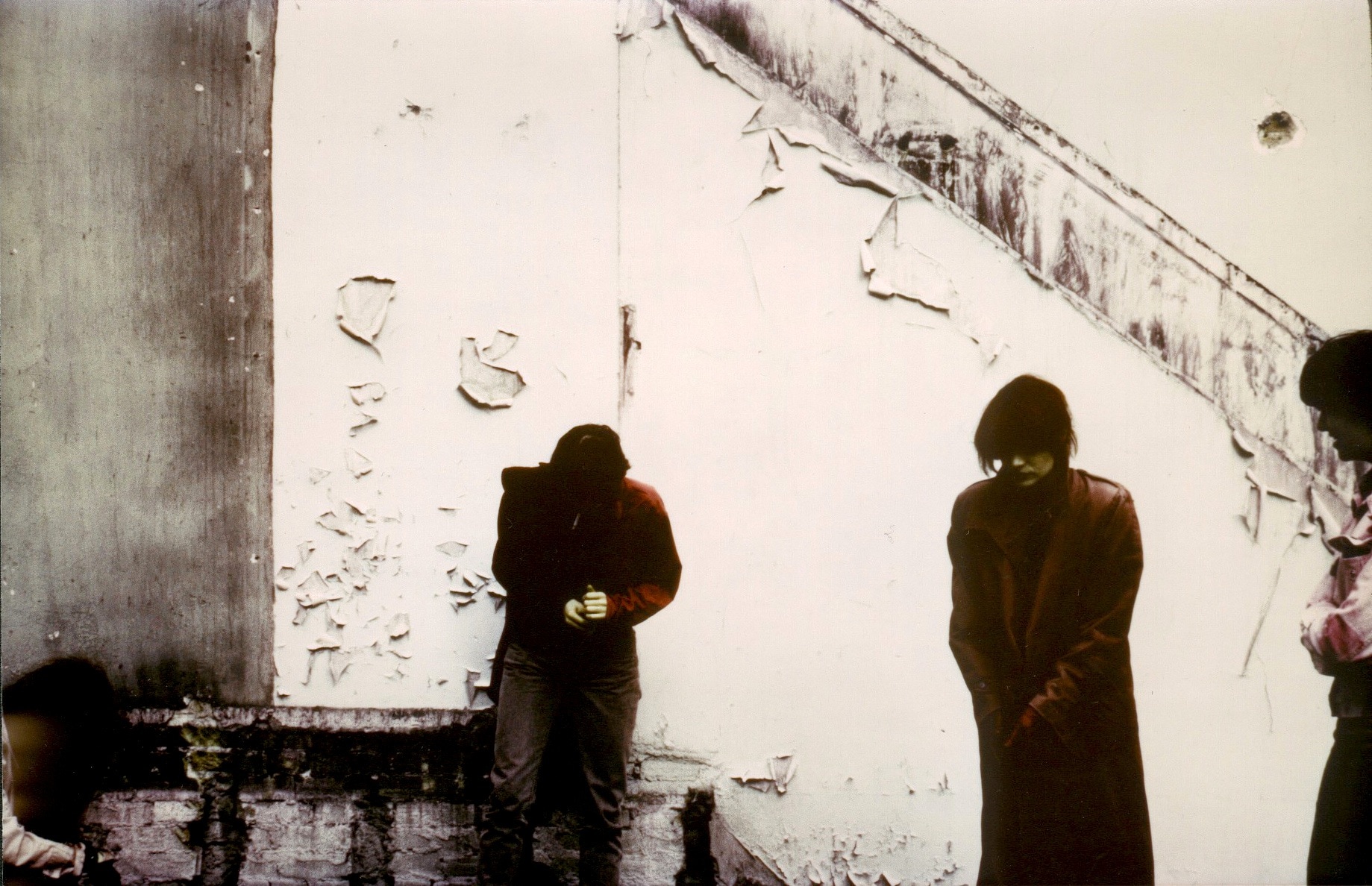
While not everyone can sing or play a musical instrument, most of us can speak. Expressing ourselves through words can take place in the privacy of our homes, out loud at school, or outside at a rally fighting for social justice. Spoken word and dub poetry are words that are meant to be spoken out loud, playing with rhythm, experimenting with emphasis, intonation, speed, embodying the meaning of specific words.
Spoken word artist, activist, mentor, and educator Lillian Allen is a pioneer and leader in dub poetry.
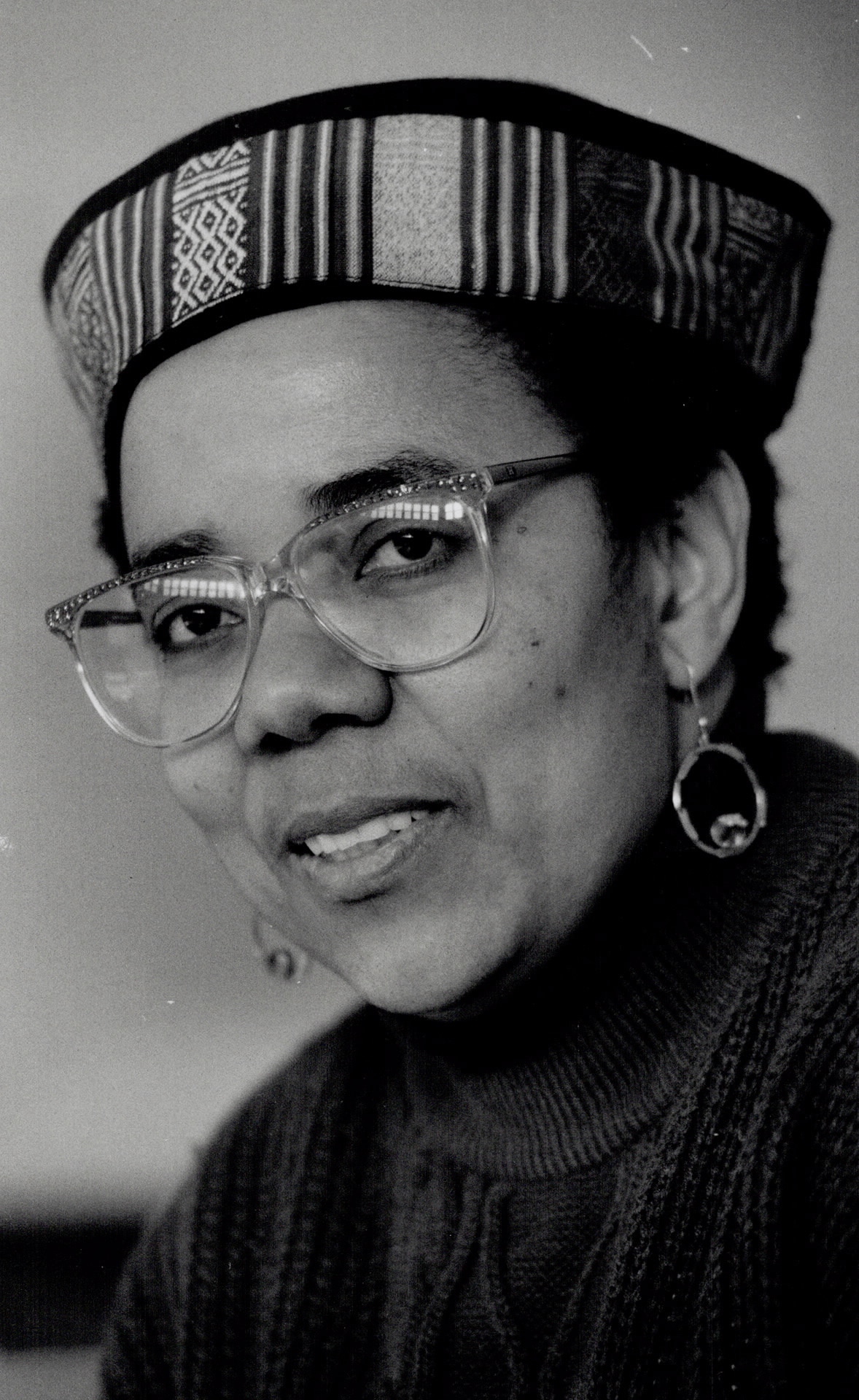
Lillian Allen in 1991.
Photo by John Mahler, courtesy of the Toronto Star Photo Archives
Early Days
Born in 1951 in Jamaica, Lillian Allen immigrated to Canada in 1969. She attended school in New York City studying communications, Black studies, and creative writing. She settled in Toronto in 1974.
In Toronto in the 1980s, Queen Street West was on the rise: bustling with music and the arts. Allen was instrumental in advancing Canadian dub poetry as an important part of the Canadian Jamaican music scene.
Various artists and cultural workers [would] come down to Queen Street, to partake of what they were involved in.
[T]hey actually reached out and embraced us and brought us in, and that was the genesis for the cultural revolution that happened in the city, right on Queen Street.
—Lillian Allen, Interview with Heritage Toronto, 2019
Dub Poetry
Rooted in oral and scribal traditions, dub poetry is a form of performance poetry crystalized in Jamaica in the 1970s. Early dub poets such as Jamaica’s Oku Onoura and Linton Kwesi Johnson layered spoken word poetry over reggae rhythms.
Dub poetry also was rooted in calls for political and social change: Onoura’s work touches on police brutality, racism, and social injustice.
Lillian Allen met Onoura in 1978 at the World Festival of Youth in Cuba, recognizing in each other a similar style of performance and political activism. Allen became a leader of dub poetry within North America, organizing festivals, intersecting cultures and arts, all while striving for equity and equality.
The work of Allen as well as her fellow dub poets challenge systemic issues in their descriptions of Black, refugee and immigrant cultures, social issues, women’s rights, and oppression. Allen’s work is also rooted in activism and feminism.
Dub poetry is just another chapter in a long succession of dynamic innovative forms which includes the griots of Africa, slave narratives, the dialect poetry of Paul Lawrence Dunbar, the Baptist church preacher.
There are blues poets—Langston Hughes and others of the Harlem Renaissance...black American jazz and blues poets of the sixties, Jamaican DJs and then dub poets and black American rap…
Bringing out the dynamism of the word has always been part of black culture and lifestyle.
—Clifton Joseph, Canadian dub poet, De Dub Poets, 1983
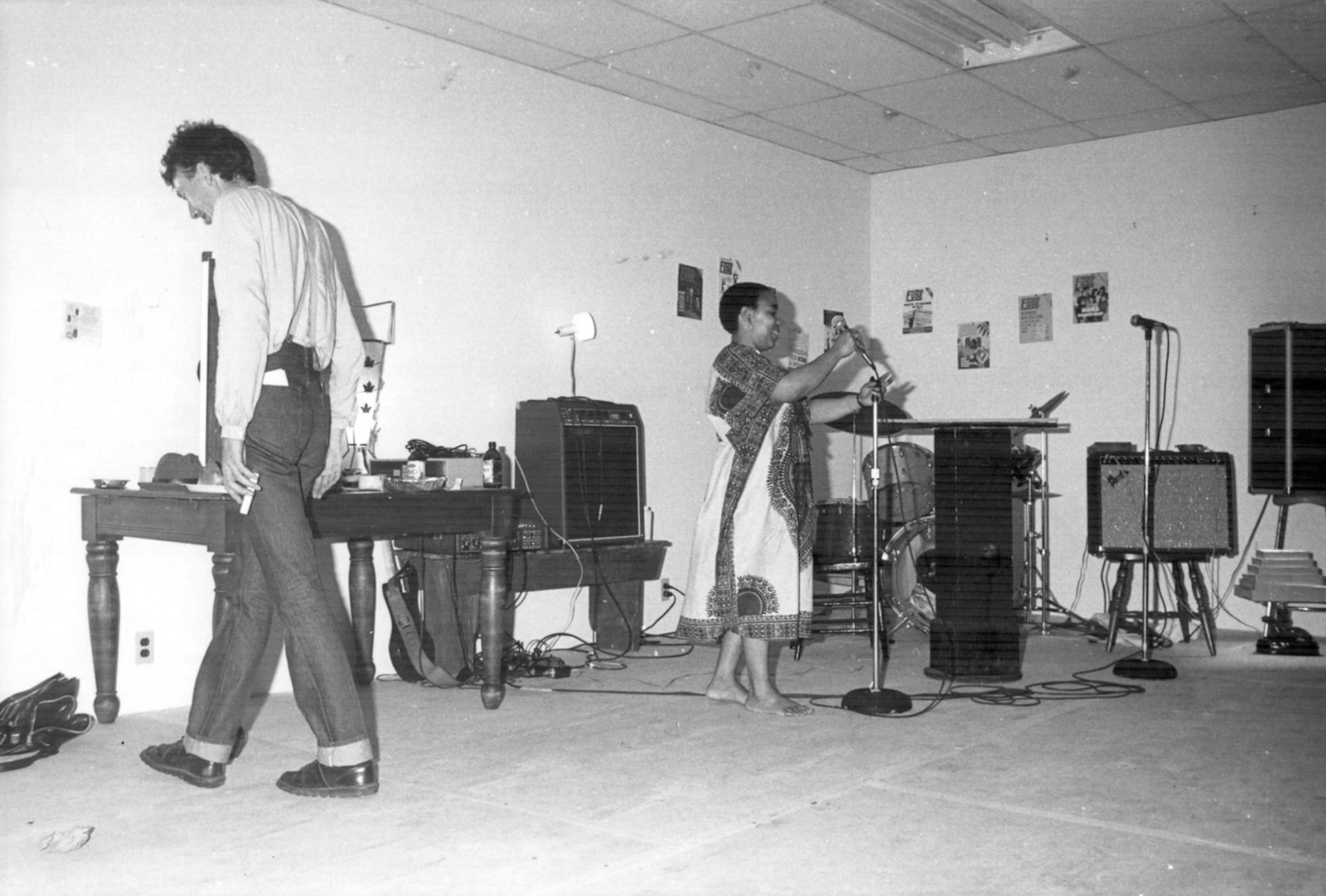
Lillian Allen performs at the FUSE awards at the Women’s Cultural Building in downtown Toronto, July 13, 1983. FUSE was a Toronto-based Canadian non-profit arts and culture periodical and was one of Canada’s longest running alternative art publications (1976–2014).
Photo by Geoff Miles, courtesy of the Clive Robertson Archives
My stance is what we would call a decolonize and post-colonial stance. A decentering of white-ness. (…) I talk about rights. I talk about the harshness and the stupidity of racism. I talk about unity. I talk about our connection to the land. I talk about our connection to Indigeneity.
— Lillian Allen, Interview with Heritage Toronto, 2019
Listen: I Fight Back
As a cultural activist, Lillian Allen’s work explores and illuminates numerous injustices including colonialism, societal and institutional racism, and racial discrimination.
During the 1950s, many Jamaican women came to Canada to work for wealthy families. Allen’s 1969 poem “I Fight Back” uncovered the exploitation and often poor treatment of Canadian Jamaican domestic workers. Written from the perspective of such a worker, the poem is infused with messages of strength and resistance.
Emotionally performed and recorded, Lillian uses intonation and manipulates the sound of words stressing certain syllables. Fusing reggae and rock music traditions, notice how her voice sounds almost like a siren while saying the word "imperial."
This online exhibition uses third-party applications including Spotify and YouTube. Check with your organization’s web administrator if you are unable to access content from these channels in the exhibition.
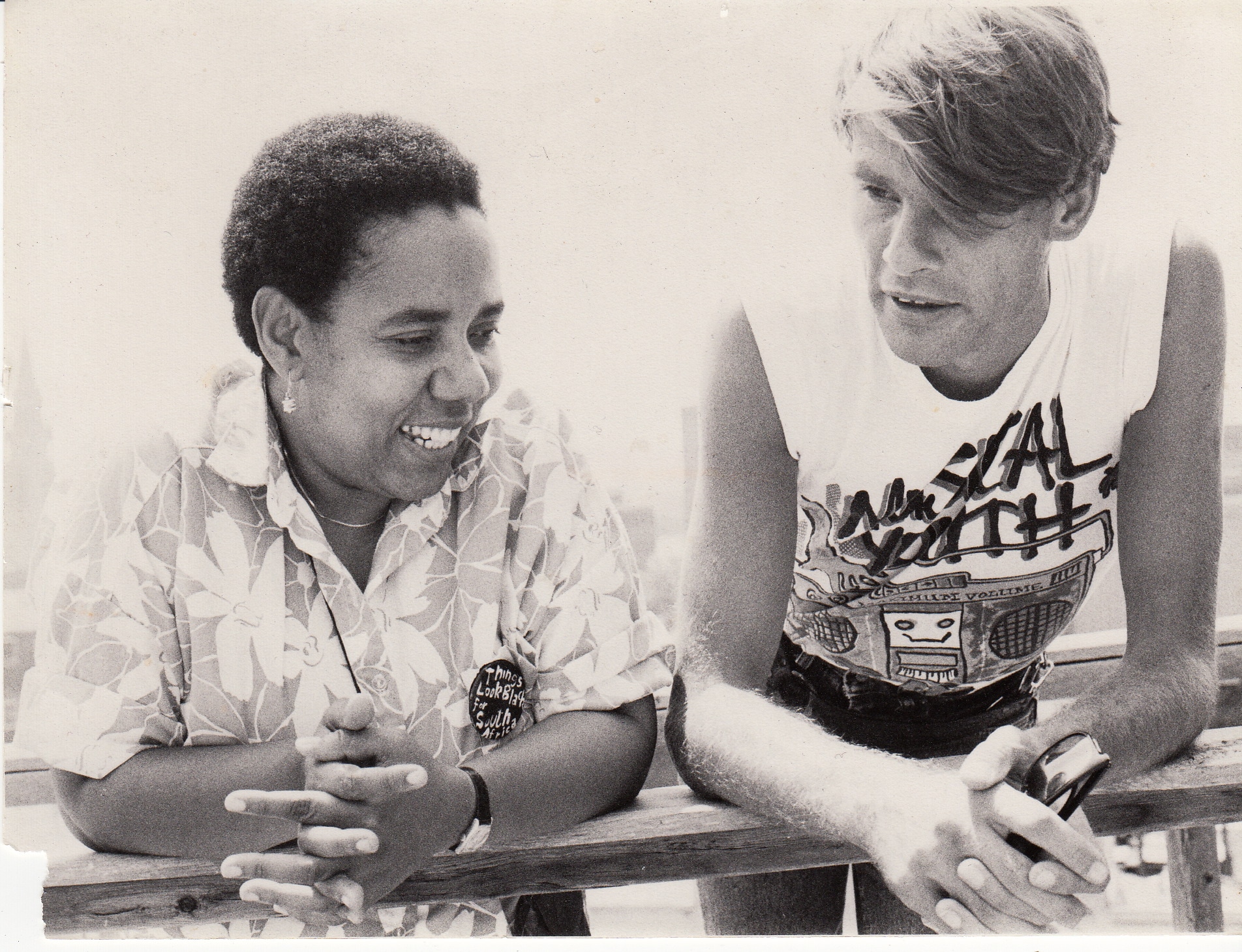
Lillian Allen with fellow artist, percussionist, and friend Billy Bryans (1947-2012), c. 1985. Billy produced Lillian’s first album Revolutionary Tea Party, working together with her to figure out how best to meld music with her texts. Billy crossed all genres of music, bringing people together, and was a founding member of The Parachute Club.
Photo by Isobel Harry, courtesy of Nicholas Jennings
Lillian in Toronto
Lillian Allen has worked with many musicians and artists in Toronto. She co-wrote lyrics for Toronto’s socially conscious reggae band Truth & Rights. She also performed and recorded with Devon Haughton and Clifton Joseph as De Dub Poets. Allen also performed and recorded for many years with various members of the prominent Toronto band The Parachute Club.
Allen won the 1986 JUNO Award for best solo album for her Revolutionary Tea Party, which mixed calypso and reggae music with her dub poetry. She also received a JUNO Award for her 1988 album, Conditions Critical.
Allen's voice became a revolution—a combination of her creativity, use of language, and activism.
Watch: pOetic gEsture
Watch Lillian share part of her 2009 poem “Toronto – pOetic gEsture”, a poem infused with rhythms and imagery that reflect life in the city, a place she has called home for decades. She also speaks about the history of dub poetry and her work as a poet, activist, and educator in Toronto.
This online exhibition uses third-party applications including Spotify and YouTube. Check with your organization’s web administrator if you are unable to access content from these channels in the exhibition.

Video directed and produced by Blake Hannahson for Heritage Toronto. Music by Samuel Gottlieb.
View Transcript[Music]
Lillian Allen: An’ de beat of Toronto
ah rhythm & the sway
cannot wait to be embraced
This diverse alive in verse city
where trees grow around the cement
Our new self in concrete
Our feet against concrete
As we go about our ways
Percussion play echoing
learning to love what we have made
softening between brick and cement
a built-up world, steeples and stairs
glass mirrors
sparing for social change
Toronto is very exciting as a music city. I was here in the mid-late 70s. It’s such a diverse city. You have a chance to see yourself as part of a bigger whole. I am known as a dub poet, I’m a writer, I’m an arts activist.
Dub poetry belongs to a whole spectrum of African expression. In the 60s, with all the fervour around anti-racism, black power movement, the voice became front and centre. And the people who couldn’t sing, but had something to say and were good with words, dub poetry provided that opportunity.
Queen Street itself was this little backwater of a place. And they had all these little spots, places where people gathered. The cultures started to mix, as opposed to being separate. It was that impetus of the younger generation that brought it together and opened it up. That’s how our city got transformed, in that way. I was there.
In terms of the arts and culture; experiment, fail, be foolish, collaborate, shout it to the world, spend time. Treat it with love and care as if you brought another being into the world, because I think that’s what it is.
We’re dying for rituals. This city is vital because we bring souls to the city. Culture is the soul of the city. If people can get back to culture, to their roots, to connectedness. To feeling that what you’re doing is important and meaningful, that can cure almost anything.
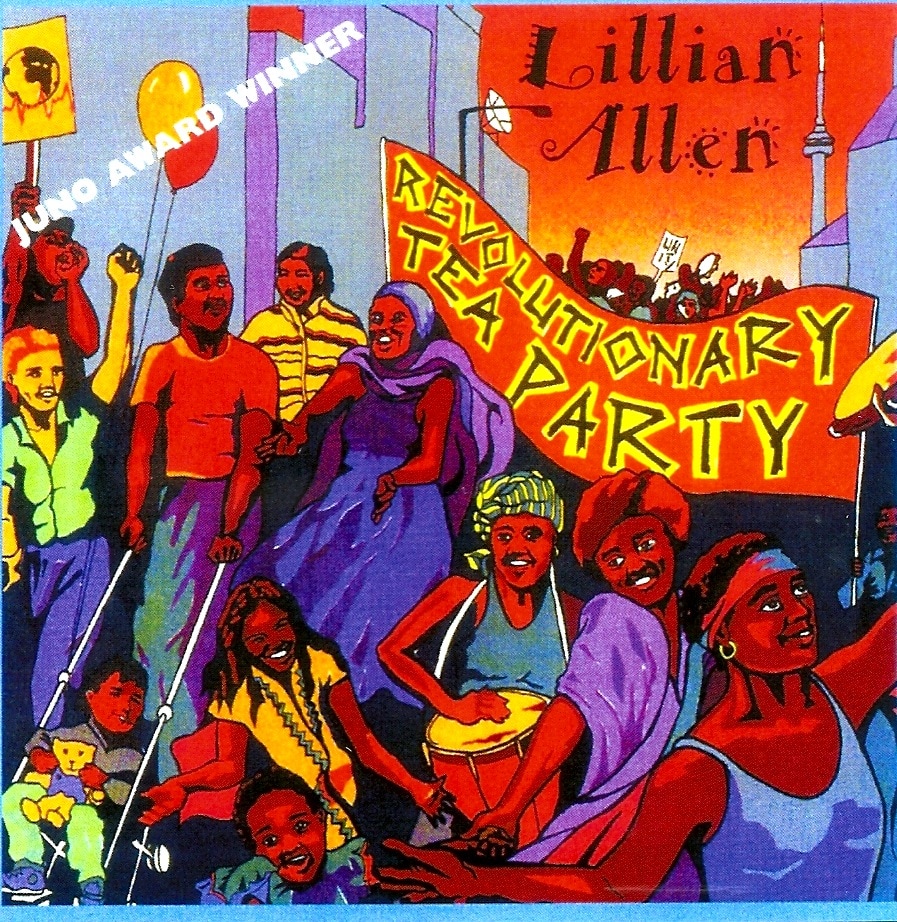
Artist Sunday Harrison created the artwork for Lillian’s 1986 JUNO Award-winning album “Revolutionary Tea Party.” Notice the images of people from different cultures coming together in the street raising their voices with Toronto’s landmark CN tower in the background. Courtesy of Lillian Allen
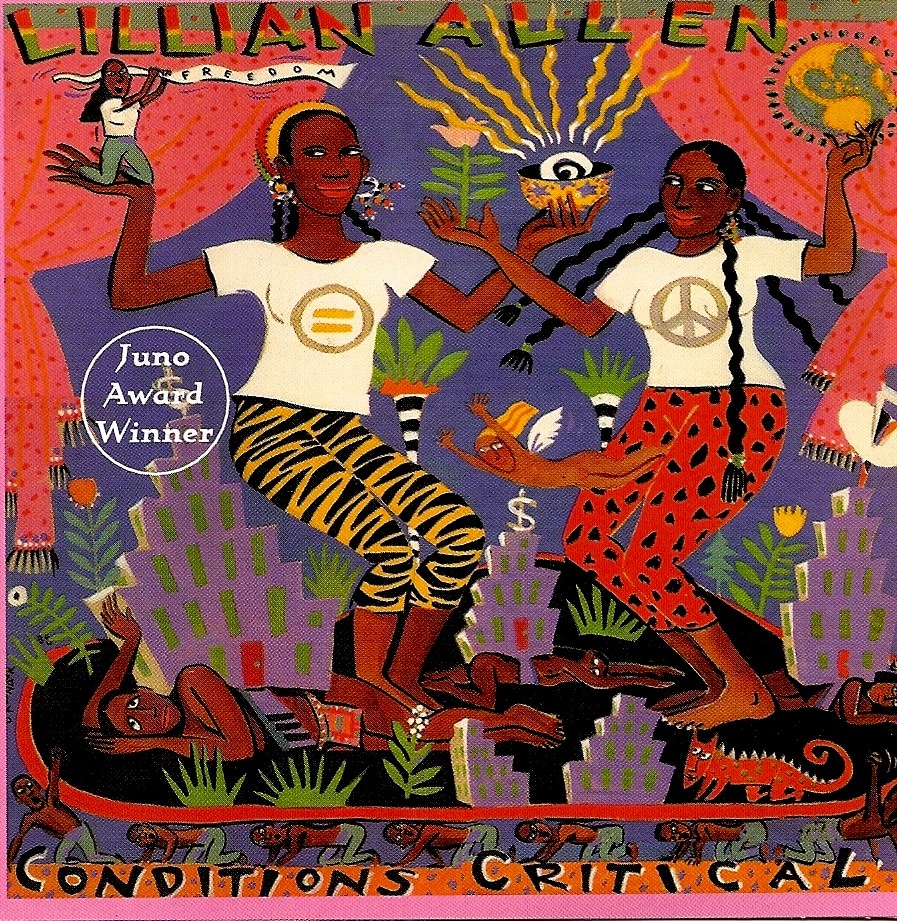
Local artist Barbara Klunder created the artwork for Lillian’s 1988 JUNO Award-winning album “Conditions Critical.” Barbara was also the resident artist at the popular Queen Street West venue, the BamBoo Club. Courtesy of Lillian Allen
Rhythm an’ Hardtimes
Lillian has written several books of poetry, including her 1983 debut self-published book of poems, Rhythm an’ Hardtimes. The title poem included in this publication and eventually recorded on the Revolutionary Tea Party album was about a young Black man, Albert Johnson, who was shot to death in his home by the Metro Toronto Police on August 26, 1979.
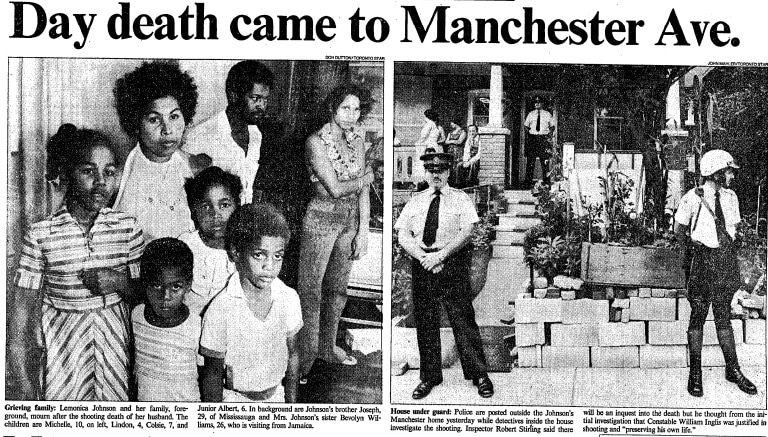
Black communities erupted in an outpour against the racial discrimination and police brutality. Nightly protests took to the streets and in front of the Police Division responsible. Lillian wrote “Rhythm an’ Hardtimes” in reaction to the events and shared it at one of the protests. Succumbing to the pressure of Black community leaders, the Metro Toronto Police opened the first external investigation with the Ontario Provincial Police, laying the foundation for the Special Investigation Unit.
After a highly publicized trial, the two officers involved with the shooting were acquitted. Unfortunately, the similarities between the Albert Johnson’s tragic murder and many contemporary cases are uncomfortable and sadly familiar. White supremacy, anti-Black racism, and racial profiling continue to exist today.
Lillian’s work continues to highlight the ongoing oppression, injustices, and racial discrimination towards Black individuals and communities. As an arts activist, Lillian highlights ways to use one’s voice to help fight for social justice and social change.
This online exhibition uses third-party applications including Spotify and YouTube. Check with your organization’s web administrator if you are unable to access content from these channels in the exhibition.
Listen: Rhythm an’ Hardtimes
hard like lead
an it bus im in im belly
an’ a Albert Johnson
Albert Johnson dead
dead
dead— Lillian Allen
Lillian Today
As a community witness and expert in cultural diversity, Lillian has worked directly with various groups and government agencies, shedding light on injustice throughout Canada.
Lillian remains active in Toronto and Canada’s artistic communities, collaborating especially with Black, Indigenous, and People of Colour groups to foster agency and build communities. Having taught at the Ontario College of Art and Design (OCAD) since 1992, Lillian developed the Creative Writing Bachelor of Fine Arts program at OCAD in 2019.
Over the last four decades, Lillian continues to write, publish, perform, collaborate, educate, and speak at events, festivals, literary panels, and conferences in North America and around the world. She encourages youth to use their voices to speak their truths, inspiring a new generation of artists and arts activists.
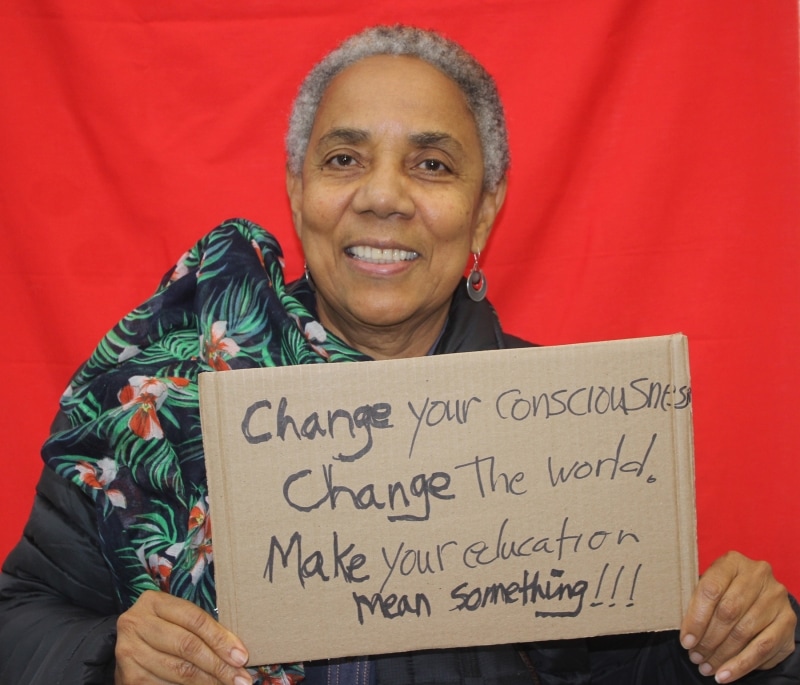
Image courtesy of Lillian Allen
Watch: Jazz You
Watch Lillian Allen perform her 1993 poem "Jazz You" on the streets of downtown Toronto.
This online exhibition uses third-party applications including Spotify and YouTube. Check with your organization’s web administrator if you are unable to access content from these channels in the exhibition.

Video produced and directed by Blake Hannahson for Heritage Toronto
View TranscriptMolten shimmer red charcoal roasting
like hot. burn.
burn black. burn sax. burn blue. burn into my flesh
brewing a potpourri of a storm ablowing waves of hues
hot wax, rise and sink, twist and sizzle in the frying pan
mood simmer
agasp gasp, gasp, gasp, gasping ... Oh yea
a breath in the life of a sound breezes through sax
breathes jazz, breathes sax
a step to beat prap … pa … pa … pap
my heart was my whipping stick. oh heart
and your soul my tambourine shake, shake on
shake life into them silent sounds solo in duet
solo on the breeze volar solar ing
be you be bird be song
sing sing the ba luse sing blue skies sing me sing you skies
sing oh oh, oh sway, oh stay ooh oh ooOOoo
sing me you sing the go away frustration blues
sing I ain't stop singing till I trucking through blues
the notes and the melody keep, slip sa lip sa lippling
oh real so real surreal slip
oo so tired and there's no music in dem here toes
music, no music, oh music, the music
always the music
Poetry, music, it is cultural voice. It is artistic voice. It is the place that you can do visioning. It’s also the place where you bring people together. Culture is the soul of the city. It crosses all boundaries.
— Lillian Allen, Interview with Heritage Toronto, 2019
Dive Deeper
Official Website of Lillian Allen
Lillian Allen. Women Do This Every Day: Selected Poems of Lillian Allen. Toronto: Women’s Press, 1993.


